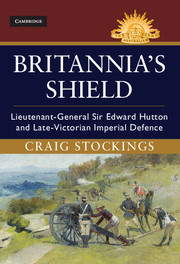Book contents
- Britannia's Shield
- Other titles in the Australian Army History Series
- Britannia's Shield
- Copyright page
- Dedication
- Contents
- Photographs
- Acknowledgements
- Introduction
- Chapter 1 ‘The common duties of the Empire’
- Chapter 2 ‘An intelligent and most active officer’
- Chapter 3 ‘I suppose he sent me a blister’
- Chapter 4 A ‘Trojan horse’ in the colony?
- Chapter 5 ‘One general policy – elastic as it may be’
- Chapter 6 ‘Making soldiers of them rapidly’
- Chapter 7 ‘I am here as one of yourselves’
- Chapter 8 ‘Pregnant of great results’
- Chapter 9 ‘Quite as much political and imperial, as it is military’
- Chapter 10 ‘Unfortunately not in touch or sympathy’
- Chapter 11 ‘Hopelessly ignorant of our self-governing Colonies’
- Chapter 12 ‘How far his vision ranged’
- Notes
- Bibliography
- Index
3 - ‘I suppose he sent me a blister’: A colonial commandant, 1893–96
Published online by Cambridge University Press: 09 March 2018
- Britannia's Shield
- Other titles in the Australian Army History Series
- Britannia's Shield
- Copyright page
- Dedication
- Contents
- Photographs
- Acknowledgements
- Introduction
- Chapter 1 ‘The common duties of the Empire’
- Chapter 2 ‘An intelligent and most active officer’
- Chapter 3 ‘I suppose he sent me a blister’
- Chapter 4 A ‘Trojan horse’ in the colony?
- Chapter 5 ‘One general policy – elastic as it may be’
- Chapter 6 ‘Making soldiers of them rapidly’
- Chapter 7 ‘I am here as one of yourselves’
- Chapter 8 ‘Pregnant of great results’
- Chapter 9 ‘Quite as much political and imperial, as it is military’
- Chapter 10 ‘Unfortunately not in touch or sympathy’
- Chapter 11 ‘Hopelessly ignorant of our self-governing Colonies’
- Chapter 12 ‘How far his vision ranged’
- Notes
- Bibliography
- Index
Summary
Events moved at a rapid pace for Hutton in early 1893. At further meetings in January with Colomb and Vincent it was suggested that he might consider taking up an appointment to command the military forces of New South Wales. The particular hook was that, in such an appointment, he might have a hand in ‘strengthening the tie between Australia and the Mother Country’ and even to ‘assist so far as possible, in bringing about the long-discussed political union of the six States of Australia’. While key figures in the Colonial and War Office worried that Federation might edge the Australian colonies away from Britain, for many ardent imperialists in it represented an opportunity for fresh and even stronger ties. A newly federated nation, united in the context of prevailing imperial sentiment in both Britain and the Australian colonies, might offer more to the Empire than the sum of its colonial constituent parts. This was particularly so for defence. A sound military system for New South Wales might subsequently be developed into a federal scheme, which in turn might help solve the strategic dilemmas of the Empire along the lines advocated by such men as Seeley. The notion fired Hutton's imagination. Here was an opportunity to exert an influence on the imperial questions that had increasingly been occupying his thoughts. From three threads – an effective force for the colony, the hope that it might be the basis of a federal military arrangement for Australia and the potential this force offered the Empire – was woven the fabric of the next phase of his career.
There is little question that well-connected and influential men like Vincent and Colomb made use of their personal relationships at the War Office and elsewhere in order to ensure the appointment of an officer like Hutton to New South Wales, as part of their own imperial agendas. Here was a young, energetic, outspoken, intelligent, ambitious, imperial-minded and reform-minded Etonian, eager to make his mark and seemingly happy to take ‘advice’ from his mentors.
- Type
- Chapter
- Information
- Britannia's ShieldLieutenant-General Sir Edward Hutton and Late-Victorian Imperial Defence, pp. 68 - 92Publisher: Cambridge University PressPrint publication year: 2015



